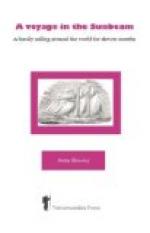Tuesday, March 6th.—The little girls and I went ashore at 7.30, to collect all our purchases with the help of a friend. We glanced at the museum too, which contains some curious specimens of Chinese and Japanese arms and armour, and the various productions of the two countries, besides many strange things from the Philippine and other islands. I was specially interested in the corals and shells. There were splendid conch shells from Manilla, and a magnificent group of Venus flower-baskets, dredged from some enormous depth near Manilla. There were also good specimens of reptiles of all sorts, and of the carved birds’ heads for which Canton is famous. They look very like amber, and are quite as transparent, being carved to a great depth. I believe the bird is a kind of toucan or hornbill, but the people here call it a crane.
It was now time to say good-bye to Hongkong and to our kind friends, for we had to go on board the ‘Flying Cloud,’ which starts for Macao at two o’clock precisely, and our passages had been taken in her. Tom could not go with us, as he had fixed to-night for the dinner at which the Chinese gentlemen proposed to entertain him; but he came to see us off. We went out of the harbour by a different way, and passed along a different side of the island of Hongkong, but the scenery was not particularly interesting. Off Choolong a heavy ground-swell, called ‘Pon choughai,’ made us roll about most unpleasantly. In bad weather, or with a top-heavy ship, this passage could not be attempted. Sometimes there are very heavy fogs, and always strong currents, so that the short voyage of forty-two miles is not absolutely free from danger.
The town of Macao is situated on a peninsula at the end of the island of the same name. It was the first foreign settlement in China belonging to the Portuguese, and was once a fine, handsome town, with splendid buildings. Unfortunately Macao lies in the track of the typhoons, which at times sweep over it with a resistless force, shattering and smashing everything in their career. These constantly recurring storms, and the establishment of other ports, have resulted in driving many people away from the place, and the abolition of the coolie traffic has also tended to diminish the number of traders. Now the town has a desolate, deserted appearance, and the principal revenue of the government is derived from the numerous gambling-houses.
We landed at the pier soon after five o’clock, and were carried across the peninsula through the town to the Praya on the other side. Here we found a large unoccupied mansion, situated in a garden overlooking the sea, and, having delivered our Chinese letters, were received with the greatest civility and attention by the comprador and the servants who had been left in charge of our friend’s house. The rooms upstairs, to which we were at once shown, were lofty and spacious, opening into a big verandah. Each room had a mosquito room inside it, made of wire




